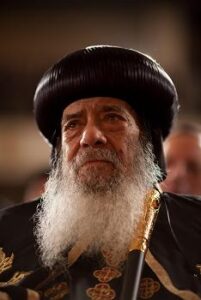
Pope Shenouda III of Alexandria, by Chuck Kennedy (Official White House Photostream)
For the last few months we’ve been considering character Archetypes, what we can learn from these as Christians, and how we can use them to express our faith in our games. There are quite a few more we could cover, based solely on what someone has dubbed the professional archetypes, and it has been mentioned that there are other categories of archetypes, such as role archetypes and personality archetypes. Originally when the idea was proposed, it seemed as if the phrase archetype was being used to avoid saying the rather loaded word class, but discussions have clearly shown the breadth of meaning the term has, and it could be a long series if we tried to cover all of even the major ones.
Thus this month we will look at one more, and then we will move away from this line for a while and cover a few other ideas that have been simmering for a while. I have dubbed this one Holy Men because I have not found another word. Priest didn’t really fit the image I had, as it is too ecclesiastic. I wanted to say monk, but avoid the kung fu connotations. It is the friar, the shukenja, the person dedicated to serving others in the name of God, who fills this slot. If I had to pick one real person to illustrate it, that best example would be Mother Theresa.
The values in this type are quite evident. The character is selfless, always putting the needs of others before his own. He is one who proclaims truth, faith, and righteousness, and who lives by those tenets. It is difficult to imagine a more direct means of bringing faith into play than to play a clerical character of this sort.
On the other hand, like life, play tests the resolve of our commitments. The holy man may be asked to put his life on the line, and he may lose it. The message projected might be one of love leading to willingness to save others through personal sacrifice, but it might instead be little more than that religious people are losers. At the same time, the failure to make that sacrifice, even if well justified at the time, might be read as hypocrisy, failing to live by that which the character teaches. Taking the opportunity to directly proclaim faith within the game world lets you do that, but it also subjects the character to heightened scrutiny, and thus tests our own ability to make choices within the difficult context of the game world.
There is a lesser complication here related to the fact that this is fiction. As we observed long ago in In Vain, it is very difficult to determine what is the will of the real living God for characters in a fictional world. There’s a good chance that whatever the game parameters are, they do not include the ability for your character to represent The God; he can only represent a facsimile of some deity created to provide some sort of spiritual framework for the game. Further, you as the cleric undoubtedly must play within the context of the nature of your deity as understood and portrayed not by you but by your referee. His idea of what God is like might be entirely alien to what you’re anticipating, even in terms of the degree to which that is revealed within the game world. All these things hamper the holy man as a character, because when you play a holy man, you are playing a character who is very much a henchman or sidekick to a referee-controlled character, his god. Your job is to make him look good; if he’s not what you thought he should be, that can strip you of much of your ability to express your faith through the character.
Most of the temptations that face this character are much the same as face most of us: spiritual pride, fear, laziness. There is also the difficulty of walking the fine line between speaking out for what is right when it will offend and failing to make a stand when it should have been made. In a sense, playing a holy man in a game is like trying to live an ordinary Christian life, only more in focus and with less certainty of the nature of God.
This is a good place to wrap up our archetypes. Adding Holy Men to Warriors, Knights, Rogues, and Wizards covers the basic types of characters in most of our fantasy games and in quite a few other kinds of role playing worlds. Perhaps we’ll come back to other types in a few months, but these should give us a foundation for thinking about how the characters we play give us opportunities to connect our faith to our games.
This article was originally published in November 2004 on the Christian Gamers Guild’s website. The entire series remains available at its original URL.
